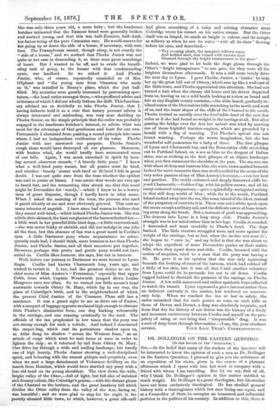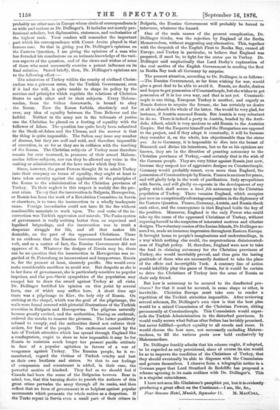DR. DOLLINGER ON THE EASTERN QUESTION. rro THE EDITOR OF
THE SPECTATOR:3
Stn,—In the belief that many of the readers of the Spectator will be interested to know the opinion of such a man as Dr. Malinger on the Eastern Question, 1 proceed to give you the substance of an exposition of his views, given in the course of a pleasant afternoon which I spent with him last week in company with a friend with whom I am travelling. But let me say, first of all, why I think Dr. Dollinger's opinion in this matter entitled to much weight. Dr. Diillinger is a great theologian, but his studies have not been exclusively theological. He has studied general history with a thoroughness which few men living can equal, and as a Councillor of State he occupies an honoured and influential position in the politics of his country. In addition to this, there is probably no other man in Europe whose circle of correspondents is so wide and various as Dr. Dollinger's. It includes not merely pro- fessional scholars, but diplomatists, statesmen, and ecclesiastics of the highest rank. Your readers will remember the important part which his correspondence with Count Arnim played in that famous ease. So that in giving you Dr. Diillinger's opinions on the Eastern Question, I am giving the opinions of a man who has founded his conclusions on an intimate knowledge of the vari- ous aspects of the question, and of the views and wishes of some of those who must necessarily exercise a potent influence on its final solution. Stated briefly, then, Dr. Dollinger's opinions are to the following effect :— The admission of Turkey within the comity of civilised Christ- endom was a grievous error, for the Turkish Government; even if it had the will, is quite unable to shape its policy by the maxims and principles which regulate the relations of Christian States to each other and to their subjects. Every Mahom- medan, from the Sultan downwards, is bound to obey _ the Koran. Now the Koran forbids, absolutely and for ever, any idea of equality between the True Believer and the Infidel. Neither in the army nor in the tribunals of justice can the Christian be placed on a footing of equality with the follower of Islam. The question has quite lately been submitted to the Sheik-ul-Islam and the Ulemas, and the answer is that the thing is quite impossible. The Sultan may issue any number of decrees, but they are null and void, and therefore impossible of execution, in so far as they are in collision with the teaching of the Koran. The Christian subjects of Turkey must therefore remain for ever unarmed, in presence of their armed Mahom- medrur fellow-subjects, nor can they be allowed any voice in the making or administration of the laws under which they live.
Since, however, the great Powers thought fit to admit Turkey into their company on terms of equality, they ought at least to have taken security against the application of the principles of the Koran to the administration of the Christian provinces of Turkey._ To their neglect in this respect is mainly due the pre- sent crisis. To aly that the insurrection in Bulgaria, Herzegovina, or Bosnia has been the work of a Revolution Committee in Servia or elsewhere, is to trace the insurrection to a wholly inadequate cause. Foreign incendiaries could not have lit the fire without combustible materials to work upon. The real cause of the in- surrection was Turkish oppression and misrule. The Pasha system of government is really nothing better than an organised and legalised brigandage, and the insurrection was in truth a desperate struggle for life, and all that makes life desirable, on the part of the oppressed Christians. There is no evidence that the Russian Government fomented the re- volt, and as a matter of fact, the Russian Government did not approve of it. Whatever the designs of Russia may be, there can be no question that the insurrection in Herzegovina was re- garded at St. Petersburg as inconvenient and inopportune. Russia is, for the present at least, sincerely pacific. She would even make considerable sacrifices to avoid war. But despotic as she is in her form of government, she is particularly sensitive to popular impulses, and the pro-Slavic sympathies of the population may compel her to draw the sword against Turkey at all risks. Dr. Dollinger fortified his opinion on this .point by several facts, one of which may suffice here. A short time ago there was a pilgrimage to Kiev, the holy city of Russia. On arriving at the chapel, which was the goal of the pilgrimage, the walls were found covered with pictorial illustrations of the Turkish atrocities in Bulgaria and Herzegovina. The pilgrims naturally became greatly excited, and the authorities, fearing an outbreak, ordered the monks to remove the pictures. The latter positively refused to comply, and the authorities dared not enforce their orders, for fear of the people. The excitement caused by the tale of Turkish atrocities which has spread through England like a conflagration, ought to show us how impossible it may be for Russia to maintain much longer her present pacific attitude in face of a popular agitation in favour of a war of vengeance against Turkey. The Russian people, be it re- membered, regard the victims of Turkish cruelty and lust as their own brethren and sisters. So that to our feelings of compassion and resentment is added, in their case, the powerful motive of kindred. They feel as we should feel if Canada had been the scene of the Bulgarian horrors. Bear in mind, too, that this burning desire to punish the authors of this great crime pervades the army through all its ranks, and then reflect that no form of government is so helpless against popular movements which permeate the whole nation as a despotism. If the Turks repeat in Servia even a small part of their crimes in Bulgaria, the Russian Government will probably be forced to intervene, whatever the hazard.
One of the main causes of the present complication, Dr. Malinger thinks, was the rejection by England of the Berlin Memorandum, without suggesting any alternative. This, together with the despatch of the English Fleet to Besika Bay, caused all Europe, and Turkey in particular, to believe that England was prepared, if need be, to fight for the status quo in Turkey. Dr. Dollinger said emphatically that Lord Derby's explanation of the real motive of the English Government in sending the fleet to Besika Bay took all Germany by surprise.
The present situation, according to Dr. Drillinger, is as follows : —The Russian Government, so far from wishing for war, would give a great deal to be able to avoid it. Russia, no doubt, desires and hopes to get possession of Constantinople, but she wishes to get - possession of it in her own way, and that is not yet. Constanti- nople is one thing, European Turkey is another, and eagerly as Russia desires to acquire the former, she has certainly no desire at all to absorb the whole of the latter. She would be very glad, for instance, if Austria annexed Bosnia. But Austria is very reluctant to do so. There is indeed a party in Austria, headed by the Arch- duke Albert, which is very anxious to add Bosnia to the Austrian Empire. But the Emperor himself and the Hungarians are opposed to the project, and if they adopt it eventually, it will be because they consider it, on the whole, less objectionable than the status quo. As to Germany, it is impossible to dive into the breast of Bismarck and divine his intentions, but so far as his opinions are known, they are in the direction of granting autonomy to the Christian provinces of Turkey,—and certainly that is the wish of the German people. They are very bitter against Russia just now, because they suspect her of aggressive designs on Constantinople. Germany would probably resent, even more than England, the possessionof Constantinople by Russia. France is anxious for peace,
and will gladly help in the work of pacification. Italy -Sympathises with Servia, and will gladly co-operate in the development of any
policy which shall secure a bond fide autonomy to the Christian population of Turkey. There remains England, which occupies just now an exceptionally advantageous position in the diplomacy of the Eastern Question. France, Germany, Austria, and Russia check each other, and the consequence is that England holds the key of the position. Moreover, England is the only Power who could take up the cause of the oppressed Christians of Turkey, without exposing herself to the suspicion of interested motives and ulterior designs. The voluntary cession of the Ionian Islands, Dr.Dollinger as- sured us, made an immense impression throughout Eastern Europe. It brought home to people's imaginations and understandings, in a way which nothing else could, the unpretentious disinterested- ness of English policy. If, therefore, England were now to take the lead in claiming autonomy for the Christian provinces of Turkey, she would inevitably prevail, and thus gain the lasting gratitude of those who are necessarily destined to take the place of the effete and incorrigible Turk. A contrary line of action would infallibly play the game of Russia, for it would be certain to drive the Christians of Turkey into the arms of Russia as their only friend.
But how is autonomy to be secured to the disaffected pro- vinces? for that it must be secured, in some shape or other, is inevitable. Christian Europe must take care to render a repetition of the Turkish atrocities impossible. After reviewing several schemes, Dr. Dollinger's own view is that the best plan would be a mixed Commission of the Christian Powers, sitting ,permanently at Constantinople. This Commission would super- • sede the Turkish Administration in the disturbed provinces. It would really secure what Sultan after Sultan has lavishly promised, but never fulfilled—perfect equality to all creeds and races. It would choose the best men, not necessarily excluding Mahom- medans, to fill the various posts now held exclusively by Mahommedans.
Dr. Dollinger frankly admits that his scheme ought, if adopted, to be regarded as only provisional, since of course its aim would be so to improve the condition of the Christians of Turkey, that they should eventually be able to dispense with the Commission and govern themselves. I observe from a telegraphic notice in a German paper that Lord Stratford de Radcliffe has proposed a scheme agreeing in its main outlines with Dr. Dollinger's. This is a singular coincidence.
I have not seen Mr. Gladstone's pamphlet yet, but it is evidently producing a great effect on the Continent.—I am, Sir, &c., Four Seasons Llotel, Munich, September 11. MacCorx.































 Previous page
Previous page